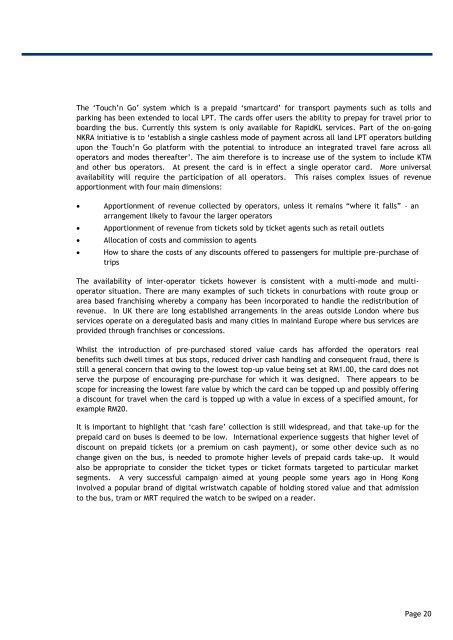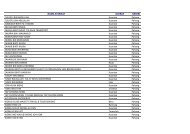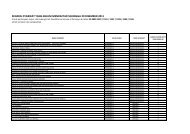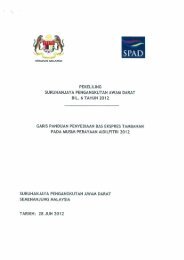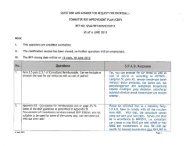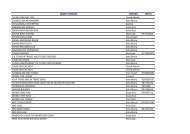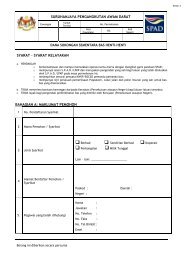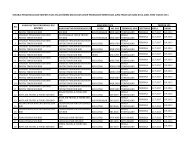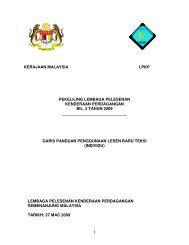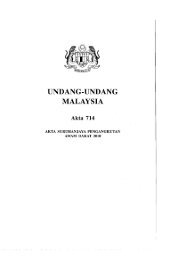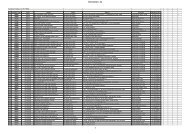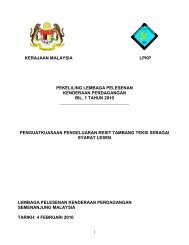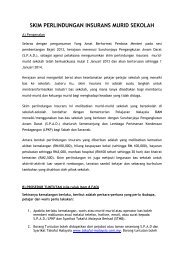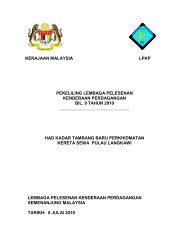Contents - SPAD
Contents - SPAD
Contents - SPAD
You also want an ePaper? Increase the reach of your titles
YUMPU automatically turns print PDFs into web optimized ePapers that Google loves.
The „Touch‟n Go‟ system which is a prepaid „smartcard‟ for transport payments such as tolls and<br />
parking has been extended to local LPT. The cards offer users the ability to prepay for travel prior to<br />
boarding the bus. Currently this system is only available for RapidKL services. Part of the on-going<br />
NKRA initiative is to „establish a single cashless mode of payment across all land LPT operators building<br />
upon the Touch‟n Go platform with the potential to introduce an integrated travel fare across all<br />
operators and modes thereafter‟. The aim therefore is to increase use of the system to include KTM<br />
and other bus operators. At present the card is in effect a single operator card. More universal<br />
availability will require the participation of all operators. This raises complex issues of revenue<br />
apportionment with four main dimensions:<br />
<br />
<br />
<br />
<br />
Apportionment of revenue collected by operators, unless it remains “where it falls” – an<br />
arrangement likely to favour the larger operators<br />
Apportionment of revenue from tickets sold by ticket agents such as retail outlets<br />
Allocation of costs and commission to agents<br />
How to share the costs of any discounts offered to passengers for multiple pre-purchase of<br />
trips<br />
The availability of inter-operator tickets however is consistent with a multi-mode and multioperator<br />
situation. There are many examples of such tickets in conurbations with route group or<br />
area based franchising whereby a company has been incorporated to handle the redistribution of<br />
revenue. In UK there are long established arrangements in the areas outside London where bus<br />
services operate on a deregulated basis and many cities in mainland Europe where bus services are<br />
provided through franchises or concessions.<br />
Whilst the introduction of pre-purchased stored value cards has afforded the operators real<br />
benefits such dwell times at bus stops, reduced driver cash handling and consequent fraud, there is<br />
still a general concern that owing to the lowest top-up value being set at RM1.00, the card does not<br />
serve the purpose of encouraging pre-purchase for which it was designed. There appears to be<br />
scope for increasing the lowest fare value by which the card can be topped up and possibly offering<br />
a discount for travel when the card is topped up with a value in excess of a specified amount, for<br />
example RM20.<br />
It is important to highlight that „cash fare‟ collection is still widespread, and that take-up for the<br />
prepaid card on buses is deemed to be low. International experience suggests that higher level of<br />
discount on prepaid tickets (or a premium on cash payment), or some other device such as no<br />
change given on the bus, is needed to promote higher levels of prepaid cards take-up. It would<br />
also be appropriate to consider the ticket types or ticket formats targeted to particular market<br />
segments. A very successful campaign aimed at young people some years ago in Hong Kong<br />
involved a popular brand of digital wristwatch capable of holding stored value and that admission<br />
to the bus, tram or MRT required the watch to be swiped on a reader.<br />
Page 20


